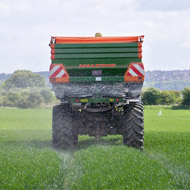
Findings could help avoid pollution caused by excess use of fertiliser
Research by the University of Edinburgh has offered fresh insights into how plants regulate their absorption nitrogen and how this could help avoid pollution caused by excess use of fertiliser.
The findings may lead to the development of crop varieties that need less of the essential nutrient than conventional crops. They could also inform how much nitrogen should be added to plant feed - allowing for excellent plant growth without producing excess run-off from fields, which is a major source of water pollution.
The research team, together with experts from the University of Campinas in Brazil, examined how nitrogen is absorbed and converted into cellular building blocks in plants.
They discovered that when nitrogen is absorbed, plant cells produce nitric oxide, which acts as a signalling molecule. The nitric oxide fine-tunes how much nitrogen is used for growth, by signalling to the plants cells when to limit its uptake.
Because nitric oxide plays an important role in shaping the development of plants, the scientists say that these insights highlight key considerations of how nitrogen-based fertilisers should be used in agriculture.
Dr Steven Spoel, who led the study, said: "Understanding nitrogen absorption better will ultimately allow us to breed crop varieties that need less fertiliser, and therefore are better for the environment."
The study was published in Nature Communications and was funded by the Royal Society and the Biotechnology and Biological Sciences Research Council.
Image (C) James T M Towill



 The Animal and Plant Health Agency (APHA) has updated its online reporting service for dead wild birds.
The Animal and Plant Health Agency (APHA) has updated its online reporting service for dead wild birds.